Types of publications Studies and publications
-
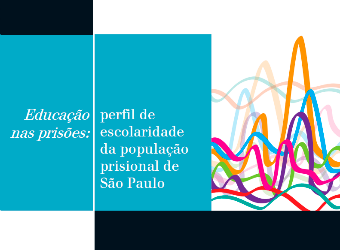 Em Questão 10 – Educação nas Prisões: perfil de escolaridade da população prisional de São Paulo (In Question 10 – Prison Education: the educational profile of the prison population in São Paulo)Apoio: Prison Pastoral / Conectas Human Rights / Public Defender’s Office of the State of São Paulo (Special Department of Prison Situation) / Instituto Práxis de Direitos Humanos (Práxis Institute of Human Rights) / Instituto Terra (Earth Institute) / Trabalho e Cidadania (Work and Citzenship). Frequent participants of the Grupo de Educação nas Prisões’ activities: Paulo Freire Institute / Alfasol / Ilanud / Geledés – Instituto da Mulher Negra (Geledés – Institute of the Black Woman) / Associação Juízes para a Democracia (Judges Association for Democracy) / Pro Bono Institute / Movimento do Ministério Público Democrático (Democratic Public Ministry Movement) / National Rapporteurship for the Human Right to Education (DHESCA Brazil Platform).
Em Questão 10 – Educação nas Prisões: perfil de escolaridade da população prisional de São Paulo (In Question 10 – Prison Education: the educational profile of the prison population in São Paulo)Apoio: Prison Pastoral / Conectas Human Rights / Public Defender’s Office of the State of São Paulo (Special Department of Prison Situation) / Instituto Práxis de Direitos Humanos (Práxis Institute of Human Rights) / Instituto Terra (Earth Institute) / Trabalho e Cidadania (Work and Citzenship). Frequent participants of the Grupo de Educação nas Prisões’ activities: Paulo Freire Institute / Alfasol / Ilanud / Geledés – Instituto da Mulher Negra (Geledés – Institute of the Black Woman) / Associação Juízes para a Democracia (Judges Association for Democracy) / Pro Bono Institute / Movimento do Ministério Público Democrático (Democratic Public Ministry Movement) / National Rapporteurship for the Human Right to Education (DHESCA Brazil Platform).This publication presents data and information that supports the public debate about the urgent need for large investments in an EJA policy in the Prison Units in São Paulo.
-
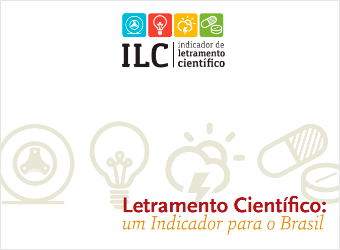 Indicador de Letramento Científico: relatório técnico da edição 2014 (Scientific Literacy Indicator: technical report of the 2014 edition)Apoio: Abramundo Institute / Paulo Montenegro Institute
Indicador de Letramento Científico: relatório técnico da edição 2014 (Scientific Literacy Indicator: technical report of the 2014 edition)Apoio: Abramundo Institute / Paulo Montenegro InstituteThe goal of Indicador de Letramento Científico (ILC) is to monitor the evolution of science skills of the Brazilian young and adult population – from 15 to 40 years old.
-
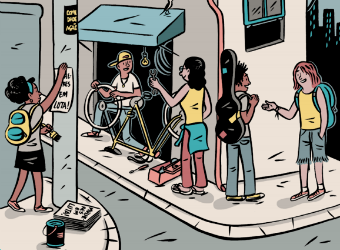 Guia Tô no Rumo: Jovens e Escolha Profissional (Guide I’m on the Path: Young People and Professional Choice)
Guia Tô no Rumo: Jovens e Escolha Profissional (Guide I’m on the Path: Young People and Professional Choice)This material is the result of a work carried out since 2007 with teachers and High School students, aiming at helping schools to become places where young people think about future projects. The guide is composed of suggestions for activities, with practical tips for educators; supporting texts to contextualize the issues discussed; support materials for the activities; and suggestions of movies, websites, and books.
-
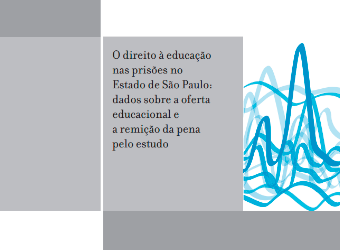 O direito à educação nas prisões no Estado de São Paulo: dados sobre a oferta educacional e a remição da pena pelo estudo (The right to education in the State of São Paulo prisons: data on the educational offer and the remission of the sentence by the study)Apoio: Public Defender’s Office of the State of São Paulo / Conectas Human Rights / Geledés – Instituto da Mulher Negra (Geledés – Black Women's Institute) / Práxis de Direitos Humanos (Human Rights Praxis) / Instituto Terra, Trabalho e Cidadania (ITTC) (Land, Labor and Citzenship Institute)/ Prison Pastoral
O direito à educação nas prisões no Estado de São Paulo: dados sobre a oferta educacional e a remição da pena pelo estudo (The right to education in the State of São Paulo prisons: data on the educational offer and the remission of the sentence by the study)Apoio: Public Defender’s Office of the State of São Paulo / Conectas Human Rights / Geledés – Instituto da Mulher Negra (Geledés – Black Women's Institute) / Práxis de Direitos Humanos (Human Rights Praxis) / Instituto Terra, Trabalho e Cidadania (ITTC) (Land, Labor and Citzenship Institute)/ Prison PastoralThis publication presents information and analysis based on a survey carried out at the Penitentiary of Santana (a neighborhood in São Paulo) in March 2014 and data provided by the Court of Justice of São Paulo on the application of Law 12,433 / 2011, which amended the Criminal Execution Law (Law 7.210 / 1984) establishing the reduction of the sentence for the people who study.
-
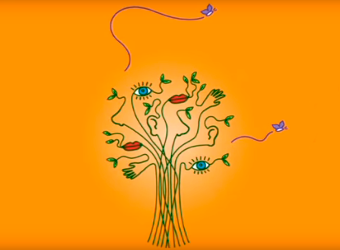 Percursos da Arte na Educação (Routes of Art in Education)Apoio: Instituto C&A
Percursos da Arte na Educação (Routes of Art in Education)Apoio: Instituto C&AA series of videos containing testimonies of 20 art-educators representing different segments of art education in Brazil (museums, culture points, schools, NGOs, universities) and with a focus on the history of art education.
-
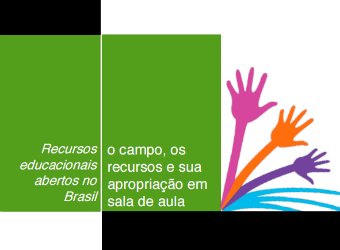 Em Questão 11 – Recursos Educacionais Abertos no Brasil: o campo, os recursos e sua apropriação em sala de aula (In Question 11 – Open Educational Resources in Brazil: the field, resources and their appropriation in the classroom)Apoio: Wikimedia Foundation
Em Questão 11 – Recursos Educacionais Abertos no Brasil: o campo, os recursos e sua apropriação em sala de aula (In Question 11 – Open Educational Resources in Brazil: the field, resources and their appropriation in the classroom)Apoio: Wikimedia FoundationThis publication results from a mapping of Open Educational Resources (OER) in Brazil, which aimed to identify existing initiatives in this area within the country, the disputes and different views on the concept of OER, law enforcement and political strategies, business models and the legal framework and public policy regarding the subject.
-
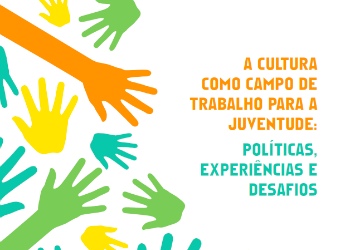 A cultura como campo de trabalho para a juventude: políticas, experiências e desafios (Culture as a field of work for young people: policies, experiences and challenges)Apoio: Centro Cultural da Juventude (CCJ) / Municipal Secretariat of Culture – São Paulo City Hall
A cultura como campo de trabalho para a juventude: políticas, experiências e desafios (Culture as a field of work for young people: policies, experiences and challenges)Apoio: Centro Cultural da Juventude (CCJ) / Municipal Secretariat of Culture – São Paulo City HallA systematization of the Seminário Cultura e Juventude (Culture and Youth Seminar), carried out by Ação Educativa and the Centro Cultural da Juventude (CCJ) (Youth Cultural Center), through the agreement of the program Jovem Monitor/a Cultural (Young Cultural Monitor). The Seminar was attended by managers, researchers, artists and young entrepreneurs as debaters and audience.
-
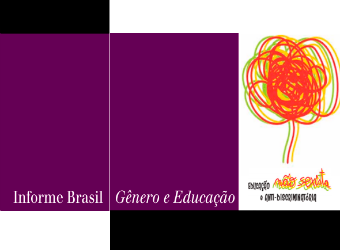 Informe Gênero e Educação (Gender and Education Report)Apoio: Dhesca Platform Brazil / Ecos – Comunicação e Sexualidade (Ecos - Communication and Sexuality) / Latin American and Caribbean Committee for the Defense of Women's Rights (CLADEM - Brazil)
Informe Gênero e Educação (Gender and Education Report)Apoio: Dhesca Platform Brazil / Ecos – Comunicação e Sexualidade (Ecos - Communication and Sexuality) / Latin American and Caribbean Committee for the Defense of Women's Rights (CLADEM - Brazil)Launched at a National Conference promoted by the Secretariat for Women’s Policies,it is an updated version of a 2011 document warning about the discontinuation of policies and public programs on education, gender and sexuality and for increasing self-censorship in government bodies under pressure from conservative religious groups.
-
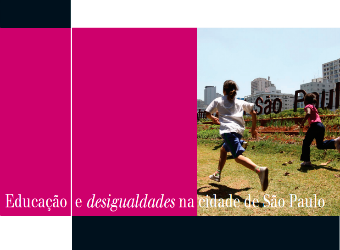 Em Questão 8: Educação e Desigualdades na cidade de São Paulo (In Question 8: Education and Inequalities in the city of São Paulo)Apoio: Rede Nossa São Paulo (Our São Paulo Network) / Instituto C&A
Em Questão 8: Educação e Desigualdades na cidade de São Paulo (In Question 8: Education and Inequalities in the city of São Paulo)Apoio: Rede Nossa São Paulo (Our São Paulo Network) / Instituto C&AThis publication presents and analyzes educational and budgetary data in order to contribute to the public debate about the directions of education in the city of São Paulo.
-
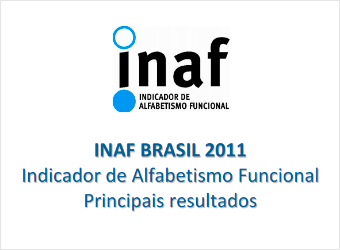 Indicador Nacional de Alfabetismo Funcional (Inaf) 2011 (2011 National Indicator of Functional Literacy)Apoio: Paulo Montenegro Institute
Indicador Nacional de Alfabetismo Funcional (Inaf) 2011 (2011 National Indicator of Functional Literacy)Apoio: Paulo Montenegro InstituteThe Paulo Montenegro Institute and Ação Educativa – partners in the creation and implementation of the Indicador Nacional de Alfabetismo Funcional (Inaf) (Functional Literacy Indicator) – present the analyzes and interpretations of the results of the most recent measurement of the literacy levels of the Brazilian adult population. For this edition, the field period occurred from December 2011 to April 2012.
